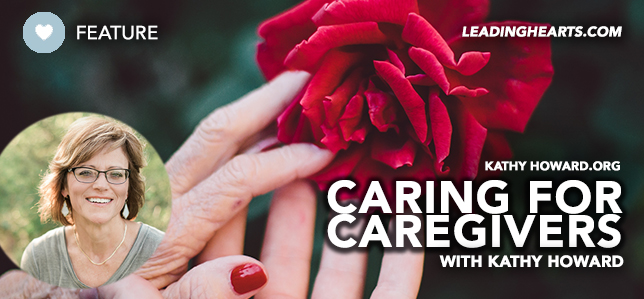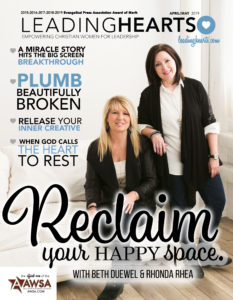
by Kathy Howard in Leading Hearts Magazine
Voices penetrated the heavy shroud of sleep. I checked my phone. Two o’clock in the morning. I could hear the anxiety in Mom and Dad’s conversation, but I couldn’t make out the words.
I threw back the covers and stumbled across the hall to their room. Dad lay on the floor beside the bed. I managed to get him sitting, but no matter how much I tried, I could not get him off the floor and back in the bed.
My husband Wayne was stirring in the other room, so I called for help. Together we got Dad up and settled back in bed. Thankfully, Dad only suffered a few bumps and bruises. But his fall dramatically reminded me I can’t care for my parents without help.
No one prepared me to care for my aging parents. And yet, here I am, struggling to navigate the family role-reversal.
The parents who cared for me, now need my care. And I am just one of the millions of women caring for aging parents.
According to an article by Renee Stepler, 23% of American adults aged 45 to 64 cares for an aging member of the family. And the majority of these caregivers are women.
Caregivers fill our church pews on Sunday morning. They attend our women’s events and Bible study groups. They live next door. Whether these women care for their parents full-time, part-time, or share the responsibility with a sibling or healthcare professionals, they long for community and need help and support.
Caregivers Need Care
Before I became a caregiver, I had no idea what caregivers need. Then the summer our youngest child graduated from high school, my father-in-law moved in. We totally skipped the empty nest phase. When the last young birdie flew out, one old birdie flew in.
Wayne’s dad lived with us for five years before he passed away. Although his mind remained relatively sound, he experienced a host of serious health issues that required an ongoing combination of surgeries, hospital care, inpatient rehab, and at-home physical and occupational therapy.
At the same time, my own parents’ condition began to deteriorate. Mom’s dementia worsened and Dad was diagnosed with Parkinson’s Disease.
My brother lived much farther away than I, so I regularly make the 8-hour round trip to their home every couple of weeks. After more than a year of minor emergencies, hospital stays, and a lot of time on the road my parents’ situation grew desperate. Finally, after months of resisting, they agreed to move.
Now, Mom and Dad are settled in their new home one mile away from my brother Gary. They have round the clock help and Gary, who is a nurse, is an integral part of their daily lives.
I regularly fly in to visit and to offer relief for my brother and sister-in-law. “I regularly fly in to visit and to offer relief for my brother and sister-in-law, because the caregiver needs care too.”
3 Ways to Help the Caregivers in Your Spheres of Influence:
There is nothing easy about caring for aging parents. No matter how much we love them, the task often demands more than the caregiver has to give – physically, emotionally, spiritually, and relationally. God can and will supply everything caregivers lack, but He often chooses to work through other people to meet those needs.
Many are willing to help but are simply not sure how. My personal experience has given me some insight into how ministry leaders and friends can offer practical help to those in our lives who care for family members at any level.
1. Ask –
Every time a friend asks me about my mom and dad my spirits lift. The simple act of asking shows concern for my parents and love for me. I feel less alone in the journey. If someone you know or minister to cares for a parent, periodically ask how their parents are doing. And ask how you can pray for them and their parents specifically.
2. Offer –
So often we say, “Let me know if I can do anything!” And although we are sincere, the offer is too general. Instead, offer specific practical help. Before we moved my parents, my friend Kayleen offered to make the trip with me from Texas to Tennessee to unpack the boxes and get the house ready for them. Although this offer was huge, our help does not have to be this big to go a long way in providing comfort and relief to the caregiver. Just be specific and practical.
3. Encourage –
Caregiving is an emotional and spiritual journey. Caregivers need a shoulder to cry on, someone to pray with, and someone to laugh with. Bring her coffee and chocolate. Text her a link to a devotional that encouraged you. Send her flowers.
Although we can’t change the circumstances for the caregiver, we can ease her burden by extending practical care and loving concern for her.
Kathy Howard is author of 30 Days of Hope When Caring for Aging Parents.




Thank you for sharing, l found myself having to care for my mum at the young age of 28, having lost my spouse at 26. It was a daunting task and those around me were not equipped to provide the support l needed. Thank God for the Holy Spirit, l learnt to pray, worship and commune with God. It wasn’t easy, but God was faithful!
Sometimes all l needed was just someone to ask, and patiently listen to me.
Ada, I am so sorry for all your young losses. But, amen, God is indeed faithful! Thank you for sharing your experience with us. And also the insight about sometimes just needing someone to show interest and listen!
Ada, I am so sorry for your losses. But praise God, He is indeed faithful! And thank you for reminding us of the need to ask others how they are doing and then listen to them!